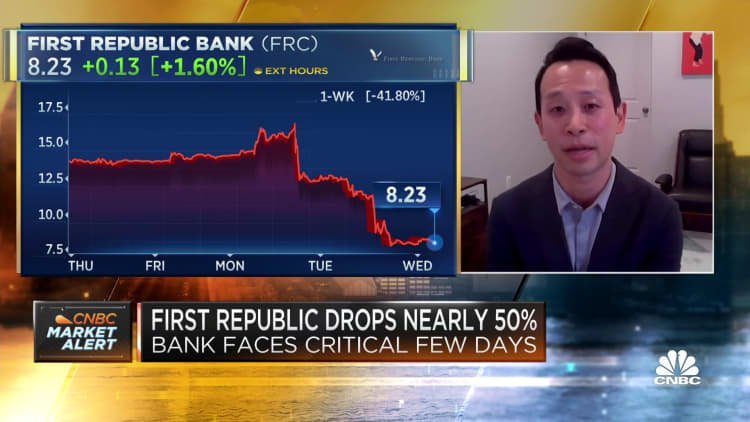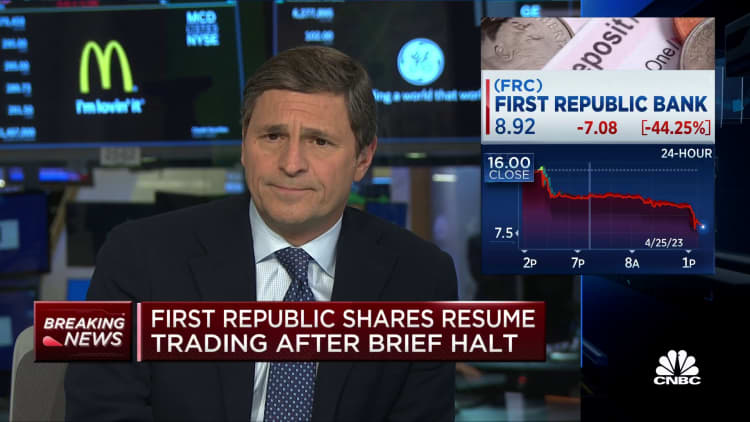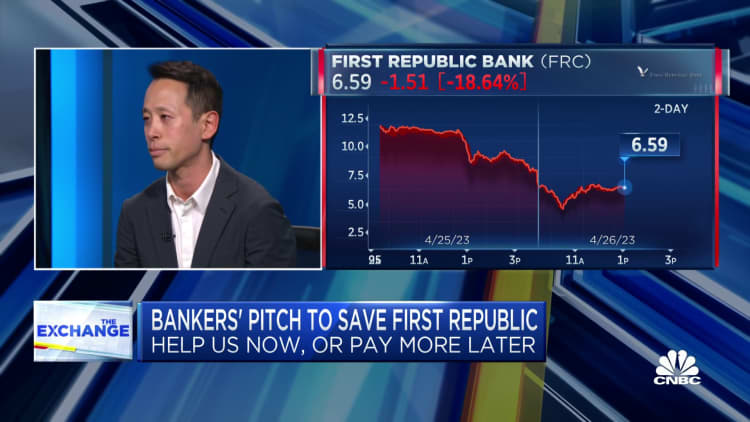
The best hope for avoiding a collapse of ailing lender First Republic hinges on how persuasive one group of bankers can be with another group of bankers.
Advisors to First Republic will attempt to cajole the big U.S. banks who've already propped it up into doing one more favor, CNBC has learned.
The pitch will go something like this, according to bankers with knowledge of the situation: Purchase bonds from First Republic at above-market rates for a total loss of a few billion dollars – or face roughly $30 billion in Federal Deposit Insurance Corp. fees when First Republic fails.
It's the latest twist in a weekslong saga sparked by the sudden collapse of Silicon Valley Bank last month. Days after the government seized SVB and Signature, midsized banks hit by severe deposit runs, the country's biggest lenders banded together to inject $30 billion in deposits into First Republic. That solution proved fleeting after the depth of the company's problems became known.
If the First Republic advisors manage to convince big banks to purchase bonds for more than they are worth — to take the hit of investment losses for the good of the banking system, as well as their own welfare — then they are confident that other parties will step up to help the bank recapitalize itself.
The advisors have already lined up potential purchasers of new First Republic stock in that scenario, according to the sources.
Crucial days

These investment bankers are now seeking to create a sense of urgency. CNBC's David Faber, who first reported on the rescue plan Tuesday, said that the coming days are crucial for First Republic.
The bank's stock has been in free fall since disclosing Monday that its deposits dropped a staggering 41% recently, leaving it with $104.5 billion in deposits, including the infusion from big banks. Analysts covering the company published pessimistic reports after CEO Michael Roffler opted not to take any questions after a brief 12-minute conference call.
"Now that the earnings are out, once you've got a window to act, it's time to do it," said one of the bankers, who asked for anonymity to speak candidly. "You never know what will happen if you wait, and you don't want to be dealing with an emergency situation."
To help a deal happen, advisors may offer warrants or preferred stock so that banks involved in the rescue can reap some of the upside of saving First Republic, the sources said.
Spokespeople for First Republic and the FDIC declined to comment for this piece.
False starts
For years, First Republic was the envy of peers as its focus on rich Americans helped turbocharge growth and allowed it to poach talent. But that model broke down in the aftermath of the SVB failure as its wealthy customers quickly pulled uninsured deposits.
Lazard and JPMorgan Chase were hired last month to advise First Republic, according to media reports.
The key advantage of the advisors' plan, they say, is that it allows First Republic to offload some, but not all of its underwater bonds. In a government receivership, the whole portfolio must get marked down at once, resulting in what Morgan Stanley analysts estimated to be a $27 billion hit.
One complication, however, is that the advisors are relying on the U.S. government to summon bank CEOs together to explore possible solutions.
There have been false starts already: One top four U.S. bank said that the government told it to be ready to act on the First Republic situation this past weekend, but nothing happened.
Big bank doubts
While the exact contour of any deal is a matter for negotiation and could include a special purpose vehicle or direct purchases, several possibilities address the bank's ailing balance sheet. The bank is weighing the sale of $50 billion to $100 billion in debt, Bloomberg reported Tuesday.
First Republic loaded up on low-yielding assets including Treasurys, municipal bonds and mortgages, making what was essentially a bet that interest rates wouldn't rise. When they did, the bank found itself with tens of billions of dollars in losses.
By drastically reducing the size of its balance sheet, the bank's capital ratios will suddenly be far healthier, paving the way for it to raise more funds and continue as an independent company.
Other possible, but less likely moves include converting the big bank's deposits into equity, or even finding a buyer. But a suitor hasn't emerged in the past month, and isn't likely given that any purchaser would also own the losses on First Republic's balance sheet.
That has led sources close to the big banks to believe that the most likely scenario for First Republic is government receivership, which is how SVB and Signature were resolved.
Those close to the banks were hesitant to endorse a plan in which they would have to recognize losses for overpaying for bonds. They also expressed distrust of government-brokered deals after some of the pacts from the 2008 financial crisis ended up being costlier than expected.
Open vs closed
But the failures of SVB and Signature – the two biggest since the 2008 financial crisis – cost the FDIC Deposit Insurance Fund many billions of dollars, which is paid for by member banks. They also benefited the buyers who were able to cherry-pick the best assets while the FDIC retains underwater bonds, the First Republic advisors noted.
Advisors referred to the private market solutions as the "open bank" option, while government receivership is the "closed-bank" scenario.
But there is a third possibility: the bank grinds on as is, slowly losing yet more value amid probable quarterly losses, talent flight and unceasing doubts.
"Time, by the way, is not the bank's friend," analyst Don Bilson wrote Tuesday. "If anything, last night's discouraging update will make it even harder for First Republic to keep what it has."



